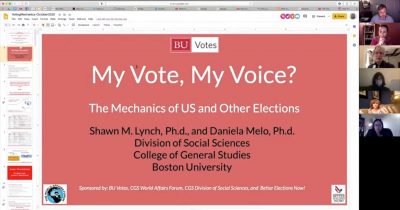When Donald Trump was elected president of the United States four years ago, about one-fourth of registered voters cast their ballot for him, while more than 40 percent did not vote at all, according to The United States Elections Project.

Since 2016, just a fraction of the country has participated in general elections. With the 2020 presidential election right around the corner, and more than 40 million people who have already cast their ballots, this is again the time to vote.
Boston University lecturers Shawn Lynch and Daniela Melo hosted “My Vote, My Voice: The Mechanics of U.S. and Other Elections” Wednesday to address the upcoming election and the power of the vote.
Lynch, a social science lecturer in the College of General Studies, is the co-founder of Better Elections Now!, a civic engagement organization that advocates for election equality and voter participation.
Lynch spoke during the event about the U.S. electoral system and the issues it generates. Those within the younger generation are discouraged to vote, he said, because they would vote on the basis of beliefs that are “entirely different” from those held by people currently in office.
“The Baby Boomer Generation and half of Generation X handed to [Generation Z] a house on fire,” Lynch said in an interview. “The only way that that fire is going to be put out and the house is rebuilt is for you to vote.”
Lynch said Generation Z’s votes matter, especially given the tumultuous state of the country.
Voter turnout is disproportionately high among white middle-class and retired populations, he said, because they are not targets of voter suppression tactics. Rather, the target is on young voters and racial minorities, who typically lean politically liberal.
“We have a class of leeches at the top, who have basically been looting us,” Lynch said. “And then we have that middle class who are class traitors, who are so desperate to get into that upper class that they sell out everybody else.”
Melo, a political scientist by training, centered her presentation comparing the U.S. Electoral College to the French electoral system.
During the discussion, Melo said she grew up in Portugal, which was under dictatorship until 1974. Melo said Americans are fortunate to participate in their government because many in other countries cannot exercise that right.
“There were entire generations that just did not have that privilege,” Melo said in an interview. “Voting is really a privilege, but it is also a duty. But unfortunately in the United States, we’ve come to a point where citizens face a ton of bureaucratic hurdles.”
These obstacles specifically harm the youth vote, Melo said. Americans have to apply and continually check their registration, whereas in countries such as France, citizens are automatically registered to vote when they turn 18. The voter registration process also differs from state to state within the U.S., with some states offering voters an easier time than others.
A lack of civic education, Melo said, also harms democracy because being informed enables citizens to better public institutions and understand how politics works.
But Lynch said change is not something that occurs overnight — it happens over generations.
Because of the Electoral College, Lynch said, the popular vote is always diminished in favor of electoral votes by state.
In the current model, 18 percent of the population controls nearly half the electoral votes, he said, meaning the results of the election may not be representative of the entire country. Currently, members of the Electoral College directly elect the president and vice president, leaving the popular vote to be an indirect vote in the system.
While he said he’s in favor of abolishing the Electoral College altogether, Lynch offered this solution to reform the institution: the Electoral College can act instead as a “safety valve,” or a fallback option, while the winner of the popular vote would most likely win the election.
Voting on Nov. 3 is the first step to fixing the system, Lynch said in an interview. For the U.S. to guarantee enfranchisement to all its citizens and add a constitutional amendment to abolish the Electoral College, young people have to vote, Lynch said.
“This is going to have to be you demanding,” Lynch said. “If you stand up for yourselves, you will win.”

















































































































Shawn M Lynch • Oct 27, 2020 at 9:51 am
Great work, thank you!